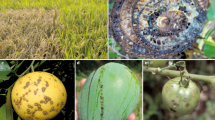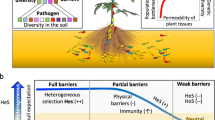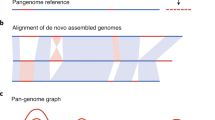Abstract
THE physiological races of most plant pathogens have been designated on an historical basis, being numbered in order of their isolation and identification. This has little intrinsic merit, because the order in which they are isolated depends largely on their relative frequencies within the population, and these frequencies vary with changes in the host population1. Moreover, rare races are likely to escape detection altogether, so that the total of known races is not a reliable guide to the inherent variability of the pathogen.
This is a preview of subscription content, access via your institution
Access options
Subscribe to this journal
Receive 51 print issues and online access
$199.00 per year
only $3.90 per issue
Buy this article
- Purchase on Springer Link
- Instant access to full article PDF
Prices may be subject to local taxes which are calculated during checkout
Similar content being viewed by others
References
van der Plank, J. E., Disease Resistance in Plants (Academic Press, London, 1968).
Allard, R. W., Plant Breeding (Wiley, London, 1960).
Black, W. B., Mastenbroeck, C., Mills, W. R., and Peterson, L. C., Euphytica, 2, 173 (1953).
Flor, H. H., Adv. Genet., 8, 29 (1956).
Author information
Authors and Affiliations
Rights and permissions
About this article
Cite this article
HABGOOD, R. Designation of Physiological Races of Plant Pathogens. Nature 227, 1268–1269 (1970). https://doi.org/10.1038/2271268a0
Received:
Issue Date:
DOI: https://doi.org/10.1038/2271268a0
This article is cited by
-
Development and characterization of common black bean lines resistant to anthracnose, rust and angular leaf spot in Brazil
Euphytica (2010)
-
A proposed system for virulence designation in India. 2.Puccinia graminis f sptritici
Proceedings / Indian Academy of Sciences (1985)
-
Clubroot resistance in turnip II. The ‘slurry’ screening method and clubroot races in the Netherlands
Euphytica (1975)
-
Octal Notation for Designating Physiologic Races of Plant Pathogens
Nature (1973)
Comments
By submitting a comment you agree to abide by our Terms and Community Guidelines. If you find something abusive or that does not comply with our terms or guidelines please flag it as inappropriate.



